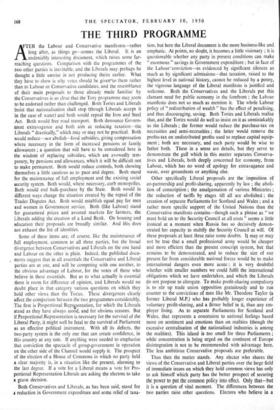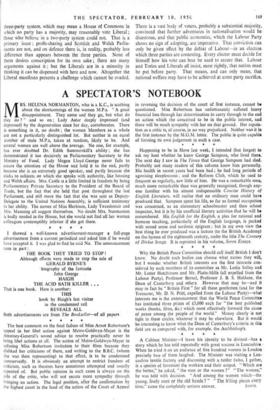THE THIRD PROGRAMME
FTER the Labour and Conservative manifestos—rather long after, as things go—comes the Liberal. It is an undeniably interesting document, which raises some far- reaching questions. Comparison with the programmes of the two other parties is inevitable, and the Liberals may perhaps be thought a little unwise in not producing theirs earlier. What they have to show is why votes should be given'to them rather than to Labour or Conservative candidates, and the resemblance of their main proposals to those already made familiar by the Conservatives is so close that the Tory programme may seem to be endorsed rather than challenged. Both Tories and Liberals insist that nationalisation shall stop (though Liberals accept it in the case of water) and both would repeal the Iron and Steel Act. Both would free road transport. Both denounce Govern- ment extravagance and both aim at reducing taxation—the Liberals " drastically," which may or may not be practical. Both would reduce—not abolish—food subsidies, giving compensation where necessary in the form of increased pensions or family allowances ; a question that will have to be considered here is the wisdom of replacing subsidies, which are avowedly tem- porary, by pensions and allowances, which it will be difficult not to make permanent. Both would reduce controls, both showing themselves a little cautious as to pace and degree. Both stand for the maintenance of full employment and the existing social security system. Both would, where necessary, curb monopolies. Both would end bulk-purchase by the State. Both would in different ways change the situation created by the repeal of the Trades Disputes Act. Both would establish equal pay for men and women in Government service. Both (like Labour) stand for guaranteed prices and assured markets for farmers, the Liberals adding the creation of a Land Bank. On housing and education their proposals are broadly similar. And this does not exhaust the list of identities.
Some of these items are, of course, like the maintenance of full employment, common to all three parties, but the broad divergence between Conservatives and Liberals on the one hand and Labour on the other is plain. Indeed, the published docu- ments suggest that in all essentials the Conservative and Liberal parties are at one, and will be competing with one another, to the obvious advantage of Labour, for the votes of those who believe in these essentials. But as to what actually is essential there is room for difference of opinion, 'and Liberals would no doubt place in that category various questions on which they hold other views than the Tories. These divergences clearly affect the comparison between the two programmes considerably. The first is Proportional Reprfisentation, for which the Liberals stand as they have always stood, and for obvious reasons. But if Proportional Representation is necessary for the survival of the Liberal Party, it might well be fatal to the survival of Parliament as an effective political instrument. With all its defects, the two-party system is the only one that can create confidence, in this country at any rate. If anything were needed to emphasise that conviction the spectacle of group-government in operation on the other side of the Channel would supply it. The prospect of the election of a House of Commons in which no party held a clear majority is, in a situation like the present, alarming to the last degree. If a vote for a Liberal means a vote for Pro- portional Representation Liberals are asking the electors to take I a grave decision.
Both Conservatives and Liberals, as has been said, stand for a reduction in Government expenditure and some relief of taxa- tion, but here the Liberal document is the more business-like and 'emphatic. At points, no doubt, it becomes a little visionary ; it is questionable whether any party in present conditions can make " enormous " savings in government expenditure ; but in face of the Labour-conviction—as evidenced by significant silences as much as by significant admissions—that taxation, raised to the highest level in national history, cannot be reduced by a penny, the vigorous language of the Liberal manifesto is justified and welcome. Both the Conservatives and the Liberals put this clamant need for public economy in the forefront ; the Labour manifesto does not so much as mention it. The whole Labour policy of " redistribution of wealth " has the effect of penalising, and thus discouraging, saving. Both Tories and Liberals realise that, and the Tories would do well to insist on it as unmistakably as the Liberals ; the former would reduce the purchase-tax on necessities and semi-necessities ; the latter would remove the profits-tax on undistributed profits used to replace capital equip- ment ; both are necessary, and each party would be wise to father both. These in a sense are details, but they serve to demonstrate the gulf which in this matter separates Conserva- tives and Liberals, both deeply concerned for economy, from Labour, which has no word of apology for extravagance and waste, over groundnuts or anything else.
Other specifically Liberal proposals are the imposition of co-partnership and profit-sharing, apparently by law ; the aboli- tion of conscription ; the amalgamation of various Ministries ; the reduction of tariffs by stages till all are abolished ; the creation of separate Parliaments for Scotland and Wales ; and a rather more specific support of the United Nations than the Conservative manifesto contains—though such a phrase as " we must hold on to the Security Council at all costs " seems a little ironical at a moment when Russia has so decisively demon- strated her capacity to stultify the Security Council at will. Of these proposals at least three raise some doubts. It may or may not be true that a small professional army would be cheaper and more efficient than the present conscript system, but that remains to be demonstrated, and to reduce the size of our present far from considerable national forces would be to make international dangers even more acute ; it is very doubtful whether with smaller numbers we could fulfil the international obligations which we have undertaken, and which the Liberals do not propose to abrogate. To make profit-sharing compulsory is to stir up trade union opposition gratuitously and to run counter to the convictions of men like Mr. Theodore Taylor (a former Liberal M.P.) who has probably longer experience of voluntary profit-sharing, and a firmer belief in it, than any em- ployer living. As to separate Parliaments for Scotland and Wales, that represents a concession to national feelings based more on sentiment and emotions than on realities (though the excessive centralisation of the nationalised industries is among the realities). This island is too small for three Parliaments ; while concentration is being urged on the continent of Europe disintegration is not to be recommended with advantage here. The less ambitious Conservative proposals are preferable.
Thus then the matter stands. Any elector who shares the views of the Conservative and Liberal parties over the large field of immediate issues on which they hold common views has only to ask himself which party has the better prospect of securing the power to put the common policy into effect. Only that—but it is a question of vital moment. The differences between the two parties raise other questions. Electors who believe in a three-party system, which may mean a House of Commons in which no party has a majority, may reasonably vote Liberal ; those who believe in a two-party system could not. That is a primary issue ; profit-sharing and Scottish and Welsh Parlia- ments are not, and on defence there is, in reality, probably less difference than appears between the three parties. None of them desires conscription for its own sake ; there are many arguments against it ; but the Liberals are in a minority in thinking it can be dispensed with here and now. Altogether the Liberal manifesto presents a challenge which cannot be evaded. There is a vast body of voters, probably a substantial majority, convinced that further adventures in nationalisation would be disastrous, and that public economies, which the Labour Party shows no sign of adopting, are imperative. That conviction can only be given effect by the defeat of Labour—in an election which three parties are contesting. Every elector must decide for himself how his vote can best be used to secure that. Labour and Tories and Liberals all insist, most rightly, that nation must be put before party. That means, and can only mean, that national welfare may have to be achieved at some party sacrifice.



































 Previous page
Previous page